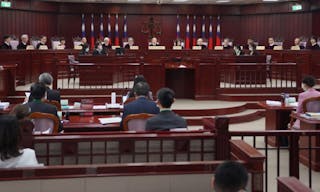What you need to know
Until the ruling today, Taiwan had been the last country in East Asia with criminal adultery laws.
Taiwan’s Constitutional Court on May 29 ruled criminal punishment for adultery is unconstitutional. The landmark verdict ends decades of debate between women’s rights activists and conservative groups who claimed it protected the sanctity of marriage.
The adultery law was a “violation of a person’s sexual autonomy” and “serious invasion of personal privacy,” said Chief Justice and President of the Judicial Yuan, Hsu Tzong-li as he announced the judgment.
Taiwan is the last country in East Asia to decriminalize adultery after South Korea’s Constitutional Court struck down the law in 2015.
According to Article 239 of Taiwan’s Criminal Code, “A married person who commits adultery with another shall be sentenced to imprisonment for not more than one year; the other party to the adultery shall be subject to the same punishment.”
“The adultery law offers limited help to maintaining a marriage” Lin Hui-huang, secretary-general of the Justice Ministry said at a press conference following the ruling. "The state’s interference into people’s marriage has a negative impact on the marriage.”
Women’s rights group, the Awakening Foundation, said the interpretation would ensure “sexual autonomy, privacy, and personal dignity." In a press statement, the foundation welcomed “the new definition of marriage and family that breaks through the constraints of sexual-loyalty based traditional morality and sees the transformation and diversity of marriage in a modern society."
The Taipei-based Awakening Foundation and other activist groups had fought against the law for decades. They claim the law violates the right to privacy and that women are disproportionately prosecuted and convicted under the law.
A 2002 attempt at a constitutional reinterpretation of the adultery law failed, as 18 justices unanimously ruled it constitutional. In 2013, a Ministry of Justice survey found 80 percent of Taiwanese supported keeping the law. But, according to Kuan, support for the law has now dropped to between 60 and 70 percent.
Few people were jailed for adultery because the sentence can be commuted to a fine of about NT$900 (US$30) per day of jail time. But the law was often used as a bargaining chip in divorce settlements, Professor Kuan Hsiao-wei, Associate Professor at the National Taipei University, told The News Lens.
As prosecutions require evidence that the two people have engaged in sexual intercourse, the law has also created an industry of private investigators to catch couples in the act, leading to invasions of privacy, Kuan said.
Taiwan’s outdated adultery law
The Awakening Foundation has been pushing to decriminalize adultery since the 1990s. They shared a few illustrative case studies with The News Lens to show the law’s impact on Taiwanese women.
A young woman was dating a man who, unbeknown to her, was already married. After discovering the affair, the man’s wife sued both of them for adultery. The young woman was left with a hefty fine and a criminal record which prevented her from working with children or finding a job abroad.
One student, who had been sexually assaulted by her married teacher, was reluctant to press charges for assault as it would open her up to adultery prosecution from the teacher’s wife.
In 2015, women made up 58.4 percent of convictions compared to 41.6 percent for men, according to the Awakening Foundation.
“For cultural reasons, women are being morally punished more often than men,” said Lin Shiou-yi, director of Research & Development at the foundation, explaining that wives may come to a settlement with their husband but still want to “punish” the woman he had an affair with.
Claims that the law protected marriage are misguided, said Kuan. The Ministry of Justice has been unable to provide data or evidence to the Constitutional Court on how pressing criminal charges has prevented adultery or saved marriages, she said.
When Japan surrendered control of Taiwan in 1945, the Kuomintang’s Civil and Criminal Codes replaced Japanese colonial rules, which had allowed a man to marry several concubines as well as his first wife. The monogamy and apparent gender equality enshrined under the KMT “made sense” to Taiwanese women, according to Kuan.
“A monogamous marriage meant equality,” explained Kuan. “After decades of implementation, people believed this is what a marriage should look like, to use criminal punishment to make sure a husband doesn’t stray away.”
Lin encouraged the government to provide more services to help married couples encountering relationship difficulties and to help reduce cultural stigma around divorce.
READ NEXT: The Women Behind MOWES, Taipei’s Inclusive Community Space
TNL Editor: Daphne K. Lee, Nicholas Haggerty (@thenewslensintl)
If you enjoyed this article and want to receive more story updates in your news feed, please be sure to follow our Facebook.



